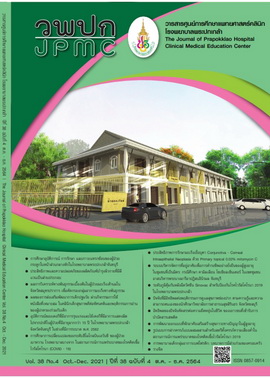A Study of the Changes of the Hemoglobin A1C Level of Diabetes Patients in Bangchak Hospital during the Coronavirus Disease (COVID - 19) Pandemic
Main Article Content
Abstract
BACKGROUND: The Coronavirus disease (COVID - 19) pandemic has affected the daily life of diabetes patients, but it is unsure how the pandemic has affected the control of patients’ hemoglobin A1C (HbA1c) level.
OBJECTIVES: To study the changes of the HbA1c level of diabetes patients in Bangchak Hospital during the COVID - 19 pandemic.
METHODS: This study was a cross - sectional analytic design. The population for the study consisted of 322 persons who were diabetes patients and had their blood tested for the HbA1c level at Bangchak Hospital, Samut Prakan Province, Thailand from May 1, to June 30, 2020. The blood test results would be compared with the previous HbA1c level that had been recorded in less than one year.
RESULTS: Regarding the 322 diabetes patients, 59.9% were female, and the age mean was 63.3 years old (SD = 11.8). Two hundred patients received a decreased/unchanged HbA1C level result (62.1%), whereas 122 patients received an increased HbA1C level result (37.9%). The patient group in which the HbA1C level had increased displayed a significantly higher eGFR (85.3 ± 20.7, 79.7 ± 23.4, p = 0.03) and lower HDL level (46.2 ± 10.7, 50.3 ± 17.0, p = 0.03) than the patient group in which the HbA1C level had decreased/was unchanged.
CONCLUSIONS: The number of patients whose HbA1C level had decreased or was unchanged was greater than those patients whose HbA1C level had increased. The patient group in which the HbA1C level had increased displayed a significantly higher eGFR and lower HDL level than the patient group in which the HbA1C level had decreased/was unchanged.
Article Details
References
World Health Organization. Coronavirus disease(COVID-19) pandemic [Internet]. 2020 [cited 2020 Sep 2]. Available from: https://www.who.int/emergencies/diseases/novel-coronavirus-2019
World Health Organization. WHO Coronavirus (COVID-19) dashboard [Internet]. 2020 [cited 2020 Sep 2]. Available from: https://covid19.who.int/?adgroupsurvey{adgroupsurvey}&gclid=EAIaIQobChMIrJOdt_Si8gIViXZgCh2dFwTWEAAYASABEgIawfD_BwE
Department of Disease Control. Corona virus disease(COVID-19) [Internet]. 2020 [cited 2020 Sep 2]. Available from: https://ddc.moph.go.th/viralpneumonia/index.php
Hussain S, Baxi H, Jamali MC, Nisar N, Hussain MS. Burden of diabetes mellitus and its impact on COVID-19 patients: A meta-analysis of real-world evidence. Diabetes& Metabolic Syndrome: Clinical Research& Reviews 2020;14:1595-602.
Guo L, Shi Z, Zhang Y, Wang C, Do Vale Moreira NC, Zuo H, et al. Comorbiddiabetes and the risk of disease severity or death among 8807 COVID-19 patientsin China: a meta-analysis. Diabetes Res ClinPract[Internet].2020 [cited 2020 Sep 2];166:108346. Available form: https://www.ncbi.nlm.nih.gov/pmc/articles/PMC7375287/pdf/main.pdf
Pal R, Bhadada SK. COVID-19 and diabetes mellitus: An unholy interaction of two pandemics. Diabetes & Metabolic Syndrome: Clinical Research & Reviews. 2020;14:513-7.
Ciceri F, Castagna A, Rovere-Querini P, De Cobelli F, Ruggeri A, Galli L, et al.Early predictors of clinical outcomes of COVID-19 outbreak in Milan, Italy. ClinImmunol[Internet]. 2020 [cited 2020 Sep 2];217:108509. Available form: https://www.ncbi.nlm.nih.gov/pmc/articles/PMC7289745/pdf/main.pdf
Barron E, Bakhai C, Kar P, Weaver A, Bradley D, Ismail H, et al. Associations of type 1and type 2 diabetes with COVID-19-related mortality in England: a whole-population study. Lancet Diabetes Endocrinol 2020;8:813-22.
Sacks LJ, Pham CT, Fleming N, Neoh SL, Ekinci EI. Considerations for peoplewith diabetes during the Coronavirus disease (COVID-19) pandemic. Diabetes ResClinPract [Internet]. 2020 [cited 2020 Oct 10];166:108296.Available form: https://www.ncbi.nlm.nih.gov/pmc/articles/PMC7332442/pdf/main.pdf
Abdi A, Jalilian M, Sarbarzeh PA, Vlaisavljevic Z. Diabetes and COVID-19: asystematic review on the current evidences. Diabetes Res ClinPract [Internet]. 2020 [cited 2020 Oct 10];166: 108347.Available form: https://www.ncbi.nlm.nih.gov/pmc/articles/PMC7375314/pdf/main.pdf
Singh AK, Khunti K. Assessment of risk, severity, mortality, glycemic control and antidiabetic agents in patients with diabetes and COVID-19: A narrative review. Diabetes Res ClinPract [Internet]. 2020 [2020 Sep 12];165:108266.Available form: https://www.ncbi.nlm.nih.gov/pmc/articles/PMC7286824/pdf/main.pdf
Alshareef R, Al Zahrani A, Alzahrani A, Ghandoura L. Impact of the COVID-19 lockdown on diabetes patients in Jeddah, Saudi Arabia. Diabetes & Metabolic Syndrome: Clinical Research & Reviews. 2020;14:1583-7.
Nachimuthu S, Vijayalakshmi R, Sudha M, Viswanathan V. Coping with diabetes during the COVID–19 lockdown in India: results of an online pilot survey. Diabetes & Metabolic Syndrome: Clinical Research & Reviews 2020;14:579-82.
BMA Data Center. Announcement of the Bangkok Metropolitan Administration (BMA), subject: order of temporary closure of premises (No. 2) [Internet]. 2020 [cited 2020 Sep 2]. Available from: http://www.prbangkok.com/th/post/view/MDY1cDBzNnM0NHIyb3Ezc3E2NnEyNDk0cDRyOTQzcjQ3MjY1MQ
BMA Data Center. Announcement of the Bangkok Metropolitant Administration (BMA), subject: order of temporary closure of premises (No. 12) [Internet]. 2020 [cited 2020 Sep 2]. Available from: http://www.prbangkok.com/th/post/view/MDY1cDBzNnM0NHIyb3Ezc3E2NnEyNDk0cDRyOTQzcjQ5MDQ4MQ
Kosachunhanun N, Benjasuratwong Y, Mongkolsomlit S, Rawdaree P, PlengvidhyaN, Leelawatana R, et al.Thailand diabetesregistry project: glycemic control in Thai type 2 diabetes and its relation tohypoglycemic agent usage. J Med Assoc Thai 2006;89 (Suppl 1):S66-71.
Gatti A, Maranghi M, Bacci S, Carallo C, Gnasso A, Mandosi E, et al. Poor glycemic control is an independent riskfactor for low HDL cholesterol in patients with type 2 diabetes. Diabetes Care 2009;32:1550-2.

